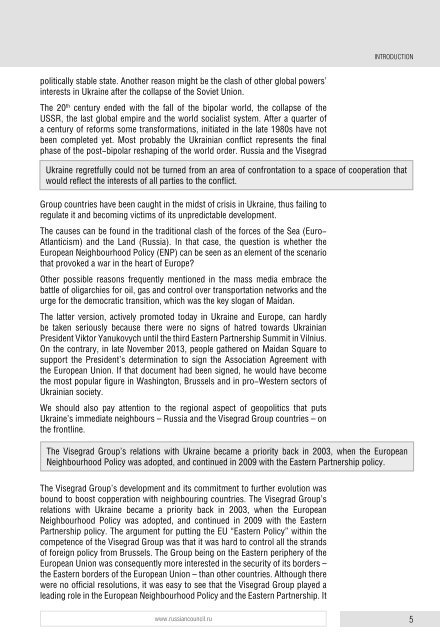RIAC-Visegrad-Report22-Eng
RIAC-Visegrad-Report22-Eng
RIAC-Visegrad-Report22-Eng
Create successful ePaper yourself
Turn your PDF publications into a flip-book with our unique Google optimized e-Paper software.
INTRODUCTIONpolitically stable state. Another reason might be the clash of other global powers’interests in Ukraine after the collapse of the Soviet Union.The 20 th century ended with the fall of the bipolar world, the collapse of theUSSR, the last global empire and the world socialist system. After a quarter ofa century of reforms some transformations, initiated in the late 1980s have notbeen completed yet. Most probably the Ukrainian conflict represents the finalphase of the post-bipolar reshaping of the world order. Russia and the <strong>Visegrad</strong>Ukraine regretfully could not be turned from an area of confrontation to a space of cooperation thatwould reflect the interests of all parties to the conflict.Group countries have been caught in the midst of crisis in Ukraine, thus failing toregulate it and becoming victims of its unpredictable development.The causes can be found in the traditional clash of the forces of the Sea (Euro-Atlanticism) and the Land (Russia). In that case, the question is whether theEuropean Neighbourhood Policy (ENP) can be seen as an element of the scenariothat provoked a war in the heart of Europe?Other possible reasons frequently mentioned in the mass media embrace thebattle of oligarchies for oil, gas and control over transportation networks and theurge for the democratic transition, which was the key slogan of Maidan.The latter version, actively promoted today in Ukraine and Europe, can hardlybe taken seriously because there were no signs of hatred towards UkrainianPresident Viktor Yanukovych until the third Eastern Partnership Summit in Vilnius.On the contrary, in late November 2013, people gathered on Maidan Square tosupport the President’s determination to sign the Association Agreement withthe European Union. If that document had been signed, he would have becomethe most popular figure in Washington, Brussels and in pro-Western sectors ofUkrainian society.We should also pay attention to the regional aspect of geopolitics that putsUkraine’s immediate neighbours – Russia and the <strong>Visegrad</strong> Group countries – onthe frontline.The <strong>Visegrad</strong> Group’s relations with Ukraine became a priority back in 2003, when the EuropeanNeighbourhood Policy was adopted, and continued in 2009 with the Eastern Partnership policy.The <strong>Visegrad</strong> Group’s development and its commitment to further evolution wasbound to boost copperation with neighbouring countries. The <strong>Visegrad</strong> Group’srelations with Ukraine became a priority back in 2003, when the EuropeanNeighbourhood Policy was adopted, and continued in 2009 with the EasternPartnership policy. The argument for putting the EU “Eastern Policy” within thecompetence of the <strong>Visegrad</strong> Group was that it was hard to control all the strandsof foreign policy from Brussels. The Group being on the Eastern periphery of theEuropean Union was consequently more interested in the security of its borders –the Eastern borders of the European Union – than other countries. Although therewere no official resolutions, it was easy to see that the <strong>Visegrad</strong> Group played aleading role in the European Neighbourhood Policy and the Eastern Partnership. Itwww.russiancouncil.ru5


